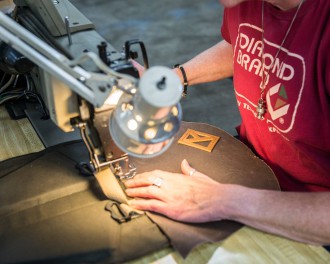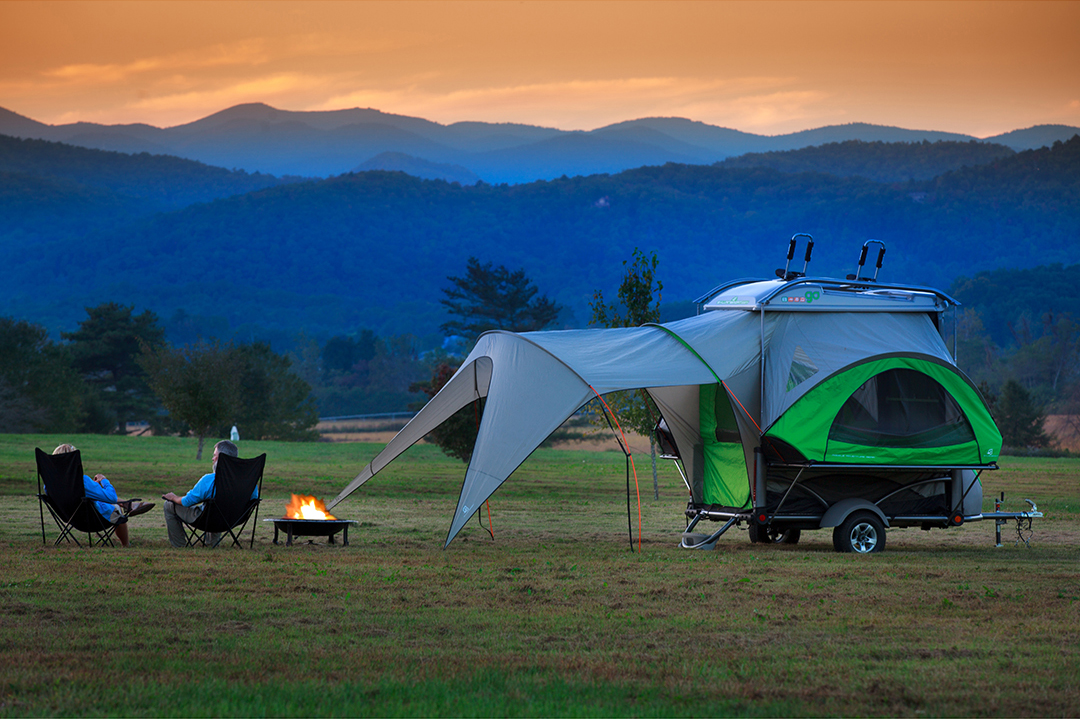Polyvinyl chloride, better known as PVC, seems to be just about everywhere. According to Tox Town, a website set up by the National Library of Medicine that tracks toxic materials, the compound can be found in raincoats, toys, shoe soles, upholstery, furniture and credit cards.
PVC also appears in life jackets. “It’s synthetic, it’s easily produced, it has some nice performance characteristics, it’s easy to work with, but it does contain toxic materials,” says Bryan Owen, sales manager at Astral, an Asheville-based company that specializes in shoes and personal flotation devices. “As they break down, they can leech into the soil and eventually get into the groundwater, and it ends up polluting the very water that we’re paddling on.”
Astral founder Philip Curry, Owen says, wanted to do something about the widespread use of PVC in the life jacket industry. Working in conjunction with the company that produces the foam used for its personal flotation devices, Astral helped develop Gaia foam, a PVC-free alternative.
“[Curry] freely shared Gaia foam with the rest of the PFD [personal flotation device] industry and really started a shift away from PVC towards a more friendly, environmentally considerate foam,” Owen says. Today, the company uses both Gaia foam and kapok, a buoyant plant fiber found in rainforest trees, in its personal flotation devices. It also shies away from neoprene, another toxic plastic that frequently appears in products designed for water sports.
Astral’s Asheville origins have a palpable influence on its environmental consciousness, but the city also leaves its mark on the company’s style.“I think that a lot of Asheville’s music culture, [as well as] our connection to local artists and craftspeople, kind of keeps our designs looking fresh,” Owen says. And Astral isn’t the only local outdoors company that draws on the tone of the surrounding area for its products.
A verdant industry
Western North Carolina is an influential part of the state’s outdoor industry, playing host to major outdoor-oriented businesses such as Astral, Liquid Logic, Diamond Brand Gear, Sylvan Sport and Eagles Nest Outfitters. And it’s a big industry: According to the Outdoor Industry Association, 56 percent of the state population participates in outdoor recreation each year. The sector generates $28 billion in consumer spending annually in North Carolina and fosters 260,000 jobs statewide, which together account for $8.3 billion in spending on wages and salaries and $1.3 billion in state and local tax revenue.
“We see our natural surroundings and activities as a major asset advantage in this industry,” says Corey Atkins, vice president of public policy with the Asheville Chamber of Commerce. “We feel that we can set the tone for the entire state when it comes to growing the outdoor recreation industry sector. This can lead, and has led, to a growth in the styles of the gear and clothing our region outputs, influencing the entire state.”
John Delaloye, CEO of Diamond Brand Gear, agrees with Atkins’ assessment. “We really want to take what is great about Asheville outside of Asheville,” he said. “The way we’re trying to incorporate that is through taking the things and partnering with the things that … really help define Asheville and help define WNC.”
Asheville in the bag

For Delaloye’s company, the region’s craft legacy is a key part of its greatness. Diamond Brand Gear recently partnered with Biltmore on a series of themed bags in an effort to put the history of the estate across the shoulders of customers across the U.S. “We’re looking to local crafts people to provide some of the fabric and some of the design looks … to really speak to the Biltmore story,” Delaloye said.
One source of this fabric is the Oriole Mill in Hendersonville. Founded in 2006, the mill was built from scratch and has a skilled labor pool drawn from the area around Hendersonville. “Everything we make is designed, woven, cut and sewn, all in one building,” says Bethanne Knudson, the design director and co-founder of the Oriole Mill. Aside from Diamond Brand Gear, the mill also partners with Sew Co., which is housed in the same building as the Oriole Mill and produces all of the mill’s sewn goods.
The Biltmore bags are part of the Diamond Brand Gear’s broader “retro perspective” toward style, says Delaloye. The company has been around in some iteration since the late 19th century, and many of the packs its sells today are inspired in some way by the products it was producing in the 1960s, 70s and 80s.
But that approach doesn’t mean the company is simply copying its older work. “We don’t necessarily want to make reproductions. We want to make bags that are inspired by those bags we made before and be in dialogue with the past,” Delaloye says. Modular design, in which components such as pockets and straps can be added or removed depending on the user’s preferences, brings Diamond Brand Gear’s bags in line with the present trend toward customization.
The brand also has a strong connection with the military and has received contracts from the national government to provide supplies to the U.S. armed services. That has influenced the company to make its products as multifunctional as possible.
“If we can have one bag that meets a few needs, that’s a better outcome than a bag that meets one need,” Delaloye says. For example, Diamond Brand Gear sells a cooler bag that can be used to transport perishable food, but the inside layer is also removable, making it more versatile for carrying other items.
Environmental consciousness
The ethos of the region’s burgeoning local agriculture movement informs Sylvan Sport and its founder, Tom Dempsey. “We believe that it makes the most sense, not only from a cost standpoint but from an environmental footprint standpoint, to make things as close to the point that you’re going to use them as possible,” he says. “That reduces fuel and costs with transporting products long distances.”
Dempsey calls Sylvan Sport “a classic, good old-fashioned soup-to-nuts company” for its integrated approach to manufacturing products such as the Sylvan Sport GO camping trailer. “We design, engineer, produce the tooling, manufacture our products and do all our marketing, sales and distribution out of this building,” he says about the firm’s Brevard facility.
Those products aim to help buyers cut their carbon emissions as they explore the outdoors. Dempsey says the Sylvan Sport GO allows small, fuel-efficient cars to compete in transport ability with more spacious but gas-guzzling vehicles. “It kind of turns your Prius into a pickup for the weekend chores,” he explains, “and turns your Prius into this RV for the weekend warrior.”
But the company goes further green through its use of efficient recyclable materials. The Sylvan Sport GO, for example, is made in part out of aluminum, which is one of the only manufacturing inputs with practically infinite recyclability. Unlike steel, plastic or cardboard, Dempsey says, aluminum does not degrade as it’s recycled and can be repurposed for a myriad of different products.When Sylvan Sport must use plastic, the company often chooses polyethylene, which Dempsey says is among the most commonly used plastics and therefore has the most complete recycling stream.
Locally sourced, globally sold
The Asheville approach to the outdoors is spreading far beyond the mountains of WNC. Astral, for example, has distributors as far away as South America, Europe and Asia. “[Asheville] was our original market for sure, and it’s where we came from,” Owen says. “But our product has been widely adopted across the U.S. and actually internationally.”
Astral’s office at 829 Riverside Drive serves primarily administrative purposes. The company does all of its warehousing and sales out of the building, and a number of staff designers also work there. Meanwhile, the brand’s footwear is made in Vietnam, and the life jackets are made in China. “We’re very much a global company,” says Owen.
Sylvan Sport also sells internationally, with dealerships in Canada, New Zealand and South Korea all stocking its products. But Dempsey says his inspiration comes from spending time outdoors — and there’s no better place to find inspiration than this area.
“We couldn’t do what we do anywhere else,” Dempsey says. “Maybe there’s a few other versatile mountain playground communities, but none like around here.”






Stylish is of course the first thing I worry about when
I enjoy the great outdoors.
I’m not calling anyone yuppie scum,
I’m just typing the words yuppie scum
in order to practice my typing skills.
Sylvan Sports…makers of the $10,000.00 tent. So white people can enjoy the outdoors.